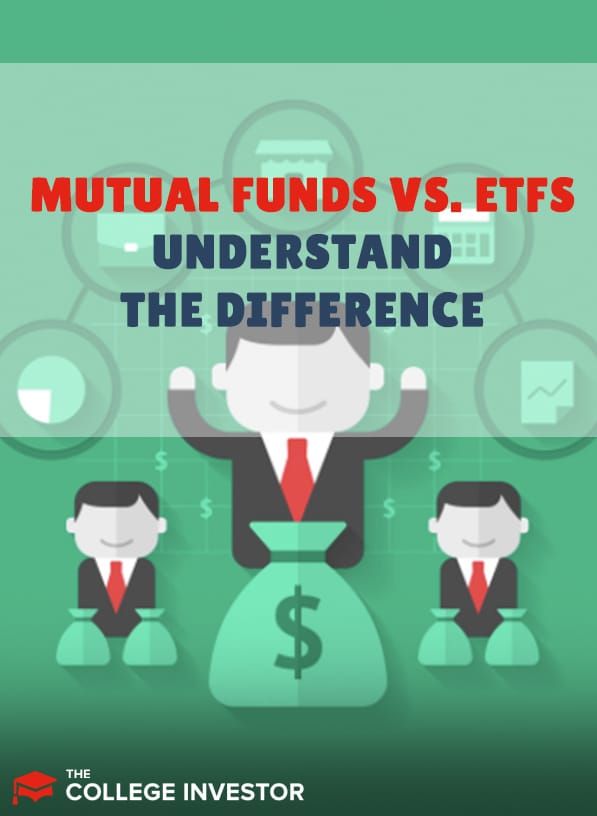
Mutual funds and ETFs may sound like the same thing to investors. But there are a few important differences between these two investment vehicles.
Fees, types of investments available, dividend payouts, and availability based on account type all come into play when choosing between mutual funds and ETFs.
For some investors, mutual funds may be the best (or only choice). But, for others, choosing ETFs may reduce their underlying costs in addition to offering more trade flexibility. In this article, we'll compare mutual funds vs. ETFs head-to-head to help you make the right choice.
What Is A Mutual Fund?
Mutual funds are baskets of securities that are often proxies for some index or sector. For example, if you want to invest in the S&P 500, you can find an mutual fund to invest in that uses the S&P 500 as its benchmark. For this reason, the fund should perform very similarly to the S&P 500 index.
Besides indexes like the S&P 500, Russell 2000, or NASDAQ, mutual funds can invest in sectors such as energy, retail, tech, real estate, metals, and lots more. Mutual funds are also popular for investing in bonds. Bond mutual funds are simply called bond funds.
Mutual funds allow investors to purchase partial shares or fund units. For a mutual fund trading at $1,000, an investor can purchase $800 worth of the fund. In a way, it’s like buying a fractional share. Purchasing fund units lets investors focus on dollar amounts invested rather than the number of shares.
Looking at the dollar amount invested instead of the number of shares is great for retirement accounts. Contributions often come into retirement accounts at some round dollar amount such as $500 or $1,000. By choosing to investing in mutual funds, retirement savers can invest every penny of their contribution without having to worry about how many shares are needed.
What Is An ETF?
The acronym "ETF" stands for exchange-traded fund. ETFs are similar to mutual funds in many ways. However, an ETF can be traded intraday (during market hours) while mutual funds only trade once per day after the market closes. Because ETFs trade like stocks, their share pricing is real-time. This aspect of ETFs might be appealing to those who are active with their investments.
Like mutual funds, many ETFs pay dividends. Fees on ETFs usually come in the form of an expense ratio only. Also, ETFs are set up to follow indexes, sectors, and bonds. When they first launched as an investment product, it was more difficult to buy ETFs in round dollar amounts than mutual funds. But today many brokers offer ETF fractional share investing.
Mutual Funds vs. ETFs: Key Differences
Unlike ETFs, mutual fund prices doesn't display like stock prices. You can look up a stock at any point during the day and see its real-time price. Mutual fund prices are only known at the end of the day and you are usually viewing the previous day's price. The price of a mutual fund is called the NAV or net asset value. From the above example, the $1,000 mentioned is the fund’s NAV.
Both mutual funds and ETFs charge management fees. The cost of these fees is often referred to as the fund's expense ratio. On average, ETF expense ratios are lower. However, there are plenty of index mutual funds to choose from that charge minuscule management fees.
However, it should be noted that some mutual funds have additional costs that you won't find with ETFs such as load fees and 12b-1 fees. Many fund companies have removed some of these extra fees. Given how easy it is to avoid load fees, there’s little reason to choose funds that still charge them.
Finally, it should be noted that you ETFs can be easier to invest in with low starting balances due to the fact that some mutual funds have investing minimum. Vanguard Admiral Share funds, for example have investing minimums of $3,000 to $100,000. Meanwhile, through fractional share investing, you may be able to start investing in ETFs with as little as $1.
Mutual Funds vs ETFs: How To Choose
If you have a 401(k), there's a strong chance that you may be restricted to mutual funds only since they allow for dollar-based contributions rather than shares. For non-401(k) accounts, mutual funds may be your best option for automatically investing the same amount every month. With some brokers (Vanguard being a prominent example), that type of investing isn't possible with ETFs.
However, ETFs will the best choice for active traders since they can bought and sold intraday. ETFs may also be a good fit for beginning investors since you won't have to worry about meeting investment minimums to gain access to the fund.
Beyond these main differences, you'll want to compare specific mutual fund and ETF choices on factors like expense ratios and dividend payouts. While ETFs have lower costs on average, a mutual fund could be the most affordable option with your particular broker for the sector or index that you're looking to invest in.
Finally, it's important to note that the choice between a mutual fund and ETF is not exclusive. Nothing says you can’t have both in your account as long as your account type allows for it. If you're ready to start investing in mutual funds and/or ETFs, check out our favorite online stock brokers and trading apps.

Robert Farrington is America’s Millennial Money Expert® and America’s Student Loan Debt Expert™, and the founder of The College Investor, a personal finance site dedicated to helping millennials escape student loan debt to start investing and building wealth for the future. You can learn more about him on the About Page or on his personal site RobertFarrington.com.
He regularly writes about investing, student loan debt, and general personal finance topics geared toward anyone wanting to earn more, get out of debt, and start building wealth for the future.
He has been quoted in major publications, including the New York Times, Wall Street Journal, Washington Post, ABC, NBC, Today, and more. He is also a regular contributor to Forbes.
Editor: Clint Proctor Reviewed by: Chris Muller
